
Glicra M 40mg/500mg Tablet
Manufacturer
Ellora Pharma Pvt Ltd
Salt Composition
Gliclazide (40mg) + Metformin (500mg)
Key Information
Short Description
Glicra M 40mg/500mg Tablet is a combination of two medicines used to treat type 2 diabetes mellitus in adults. It helps control blood sugar levels in people with diabetes.
Dosage Form
Tablet
Introduction
Glicra M 40mg/500mg Tablet belongs to a category of medicines known as anti-diabetic drugs. It is a combination of two medicines used to treat type 2 diabetes mellitus in adults. It helps control blood sugar levels in people with diabetes.
Directions for Use
Take this medicine in the dose and duration as advised by your doctor. Swallow it as a whole. Do not chew, crush or break it. Glicra M 40mg/500mg Tablet is to be taken with food.
Safety Information
Side Effects
No common side effects listed.
Alcohol Warning
It is unsafe to consume alcohol with Glicra M 40mg/500mg Tablet.
Breastfeeding Warning
Glicra M 40mg/500mg Tablet is probably unsafe to use during breastfeeding. Limited human data suggests that the drug may pass into the breastmilk and harm the baby.
Pregnancy Warning
Glicra M 40mg/500mg Tablet is unsafe to use during pregnancy as there is definite evidence of risk to the developing baby. However, the doctor may rarely prescribe it in some life-threatening situations if the benefits are more than the potential risks. Please consult your doctor.
How it works
Glicra M 40mg/500mg Tablet is a combination of two antidiabetic medicines: Gliclazide and Metformin.
Quick Tips
Monitor your blood sugar level regularly while you are taking this medicine. It can cause hypoglycemia (low blood sugar level) when used with other antidiabetic medicines, alcohol, or if you delay or miss a meal. Inform your doctor about your diabetes treatment if you are due to have surgery under a general anesthetic. Tell your doctor immediately if you experience any deep or rapid breathing or if you have persistent nausea, vomiting, and stomach pain as Glicra M 40mg/500mg Tablet may cause a rare but serious condition called lactic acidosis. Monitor your blood sugar level regularly while you are taking this medicine.
Related Medicines
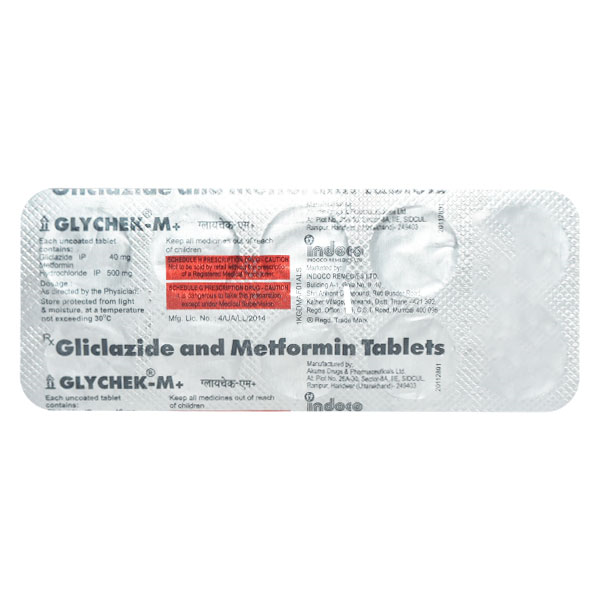
Glychek-M 40/500 Tablet
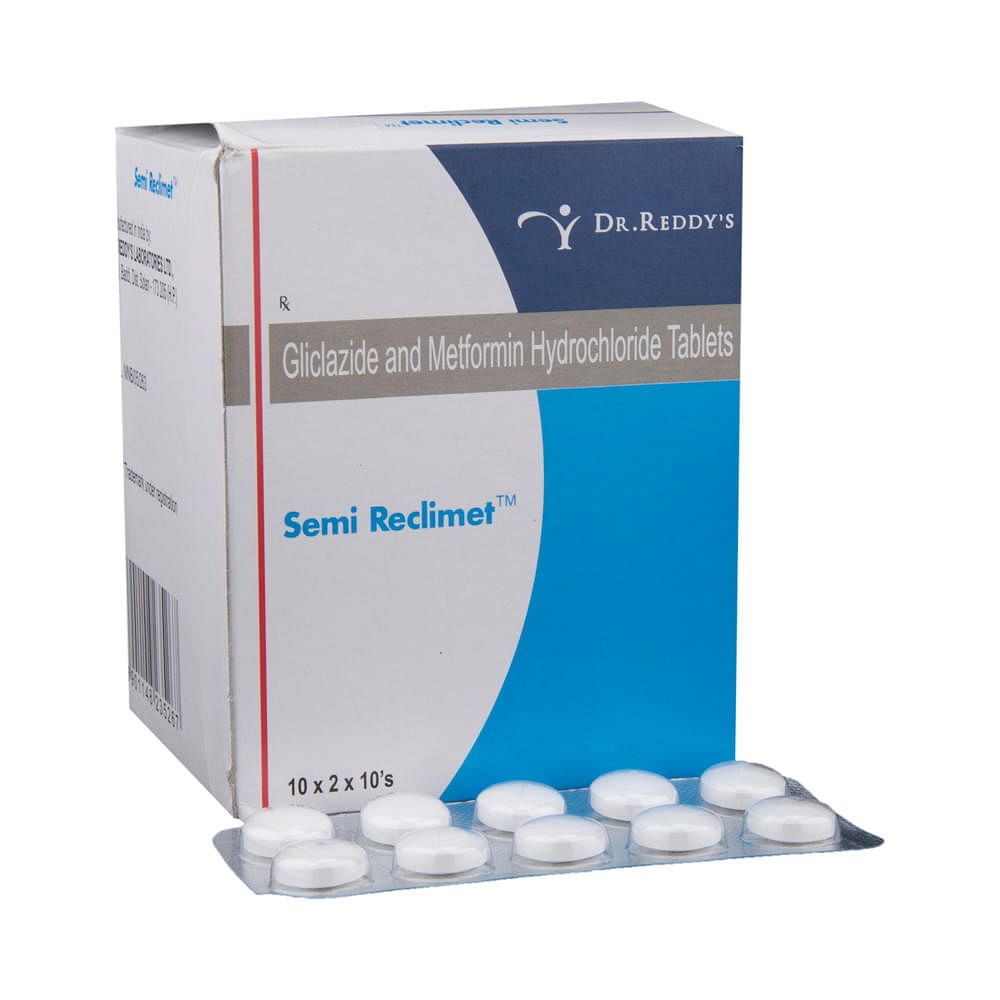
Semi Reclimet 40mg/500mg Tablet
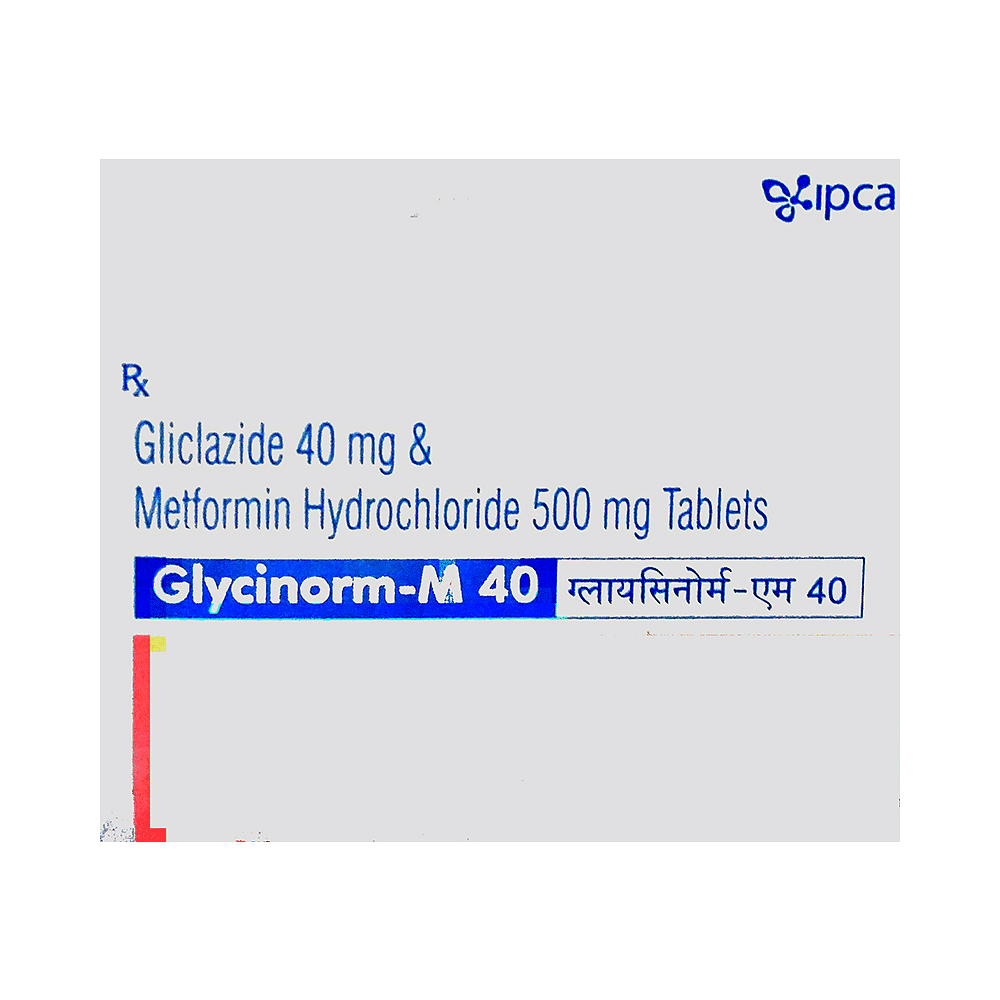
Glycinorm M 40 Tablet
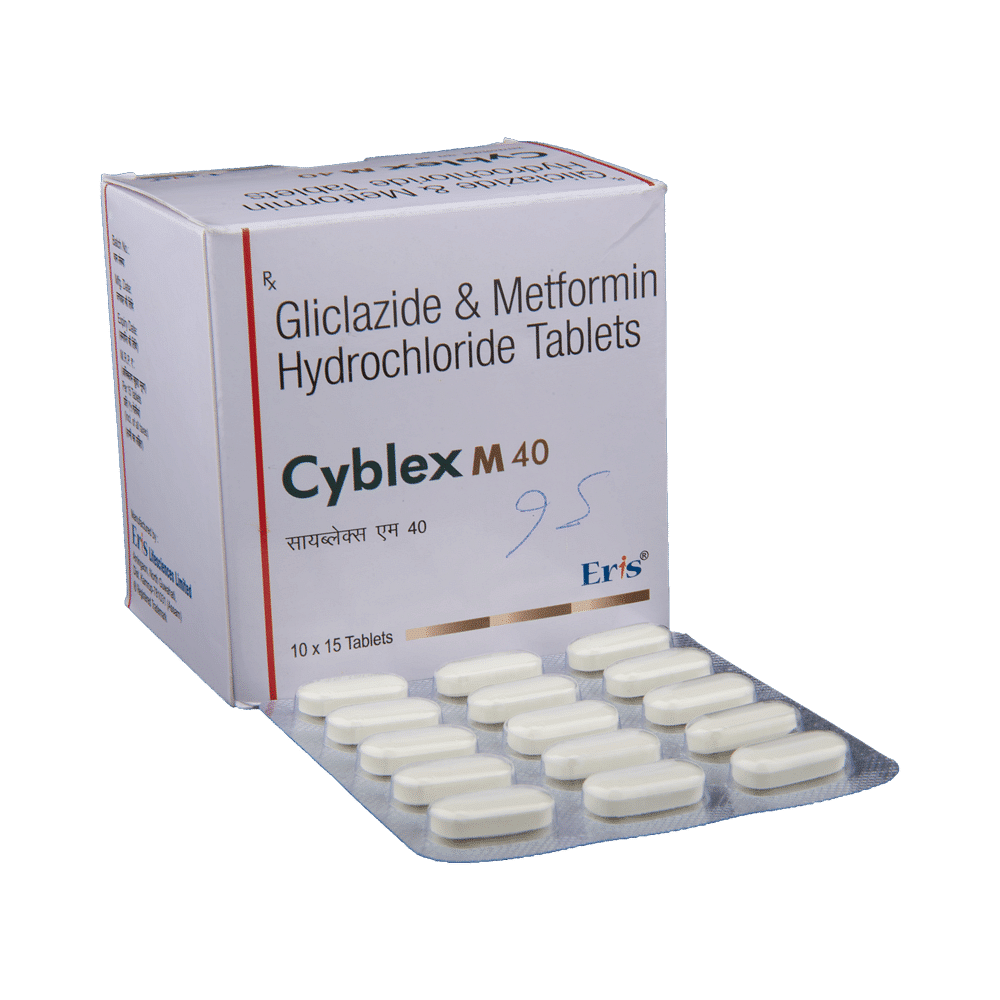
Cyblex M 40 Tablet

Glyloc-M 40mg/500mg Tablet
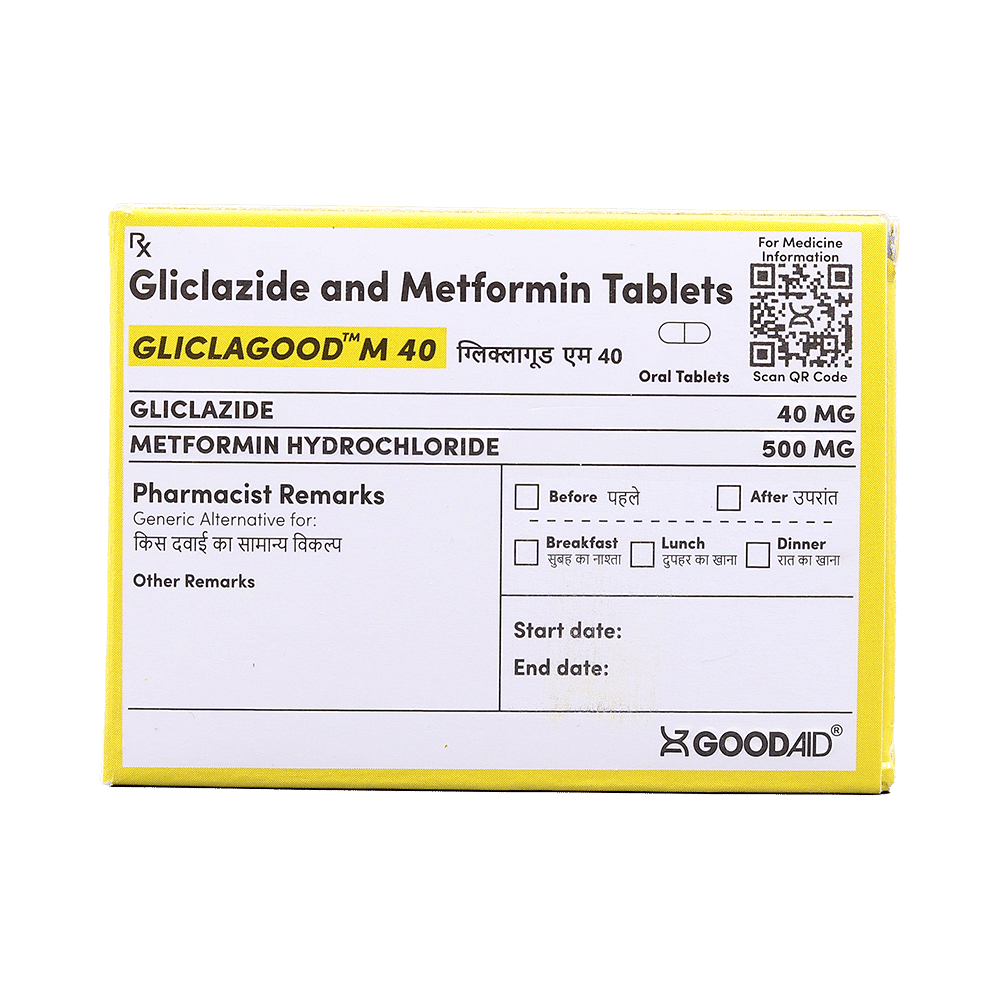
Gliclagood M 40 Tablet

Glital M 40mg/500mg Tablet

Glycivas M 40mg/500mg Tablet

Genericart Gliclazide+Metformin 40mg/500mg Tablet

StayHappi Gliclazide+Metformin 40mg/500mg Tablet
Frequently asked questions
What is Glicra M 40mg/500mg Tablet?
Glicra M 40mg/500mg Tablet contains a combination of two medicines: Gliclazide and Metformin. This medication is used to manage type 2 diabetes mellitus (DM). It helps improve blood glucose levels in adults when taken with proper diet and regular exercise.
What are the possible side effects of Glicra M 40mg/500mg Tablet?
Possible side effects include hypoglycemia (low blood sugar), altered taste, nausea, stomach pain, diarrhea, headache, and upper respiratory tract infection. In rare cases, it can lead to serious complications like lactic acidosis.
Can the use of Glicra M 40mg/500mg Tablet cause hypoglycemia?
Yes, taking Glicra M 40mg/500mg Tablet can cause hypoglycemia (low blood sugar). It's important to monitor blood glucose levels regularly and keep glucose tablets, honey, or fruit juice readily available.
Can the use of Glicra M 40mg/500mg Tablet cause lactic acidosis?
Yes, Glicra M 40mg/500mg Tablet can lead to lactic acidosis. This is a medical emergency and requires immediate medical attention.
Can the use of Glicra M 40mg/500mg Tablet cause Vitamin B12 deficiency?
Yes, long-term use of Glicra M 40mg/500mg Tablet can lead to vitamin B12 deficiency. This is because the medication interferes with the absorption of Vitamin B12 in the stomach. Untreated, it can cause anemia and nerve problems.
Are there any specific conditions in which Glicra M 40mg/500mg Tablet should not be taken?
Glicra M 40mg/500mg Tablet is not suitable for individuals with known allergies to its ingredients. Also, individuals with moderate to severe kidney disease or underlying metabolic acidosis (including diabetic ketoacidosis) may need to avoid this medication.
Is it safe to take alcohol while I am also taking Glicra M 40mg/500mg Tablet?
No, taking alcohol alongside Glicra M 40mg/500mg Tablet can be dangerous. Alcohol may lower blood sugar levels and increase the risk of lactic acidosis.
What is Glicra M 40mg/500mg Tablet?
Glicra M 40mg/500mg Tablet is a combination medication containing Gliclazide and Metformin. These medicines work together to manage type 2 diabetes mellitus (DM).
What are the possible side effects of Glicra M 40mg/500mg Tablet?
Possible side effects include low blood sugar (hypoglycemia), altered taste, nausea, stomach pain, diarrhea, headache, and upper respiratory tract infection. Rarely, it can lead to serious complications like lactic acidosis.
Can the use of Glicra M 40mg/500mg Tablet cause hypoglycemia?
Yes, using Glicra M 40mg/500mg Tablet can contribute to hypoglycemia. It's crucial to monitor blood sugar levels and keep glucose tablets, honey, or fruit juice readily available.
Can the use of Glicra M 40mg/500mg Tablet cause lactic acidosis?
Yes, Glicra M 40mg/500mg Tablet can lead to lactic acidosis. If you experience symptoms like muscle pain, dizziness, tiredness, feeling cold in arms and legs, difficulty breathing, nausea, vomiting, or stomach pain, seek immediate medical attention.
Can the use of Glicra M 40mg/500mg Tablet cause Vitamin B12 deficiency?
Yes, prolonged use can lead to vitamin B12 deficiency. This occurs because the medication hinders the absorption of vitamin B12 in the stomach.
Are there any specific conditions where Glicra M 40mg/500mg Tablet should not be taken?
It's crucial to avoid this medication if you have allergies to its ingredients. People with severe kidney disease or those suffering from metabolic acidosis (including diabetic ketoacidosis) may need to avoid it.
Is taking alcohol while using Glicra M 40mg/500mg Tablet dangerous?
Yes, drinking alcohol while using this medication can be risky. Alcohol might lower blood sugar levels and increase the risk of lactic acidosis.


